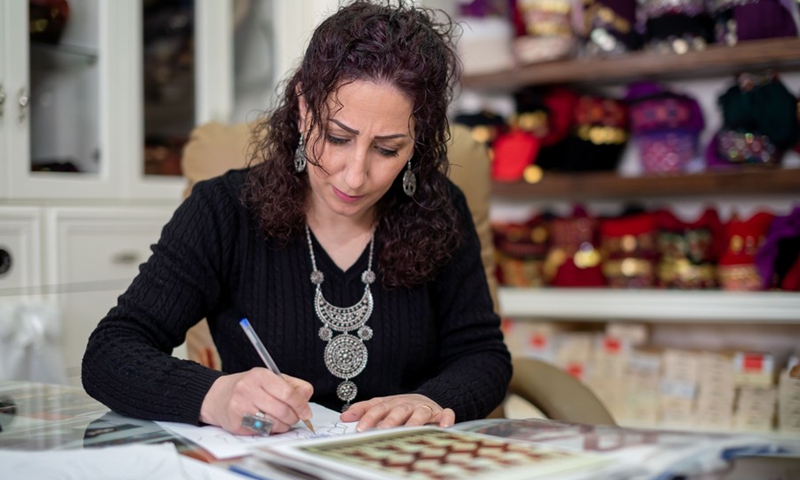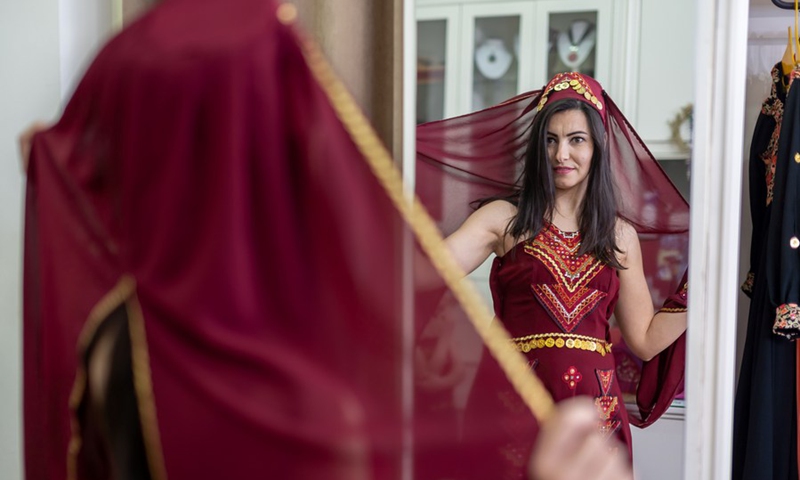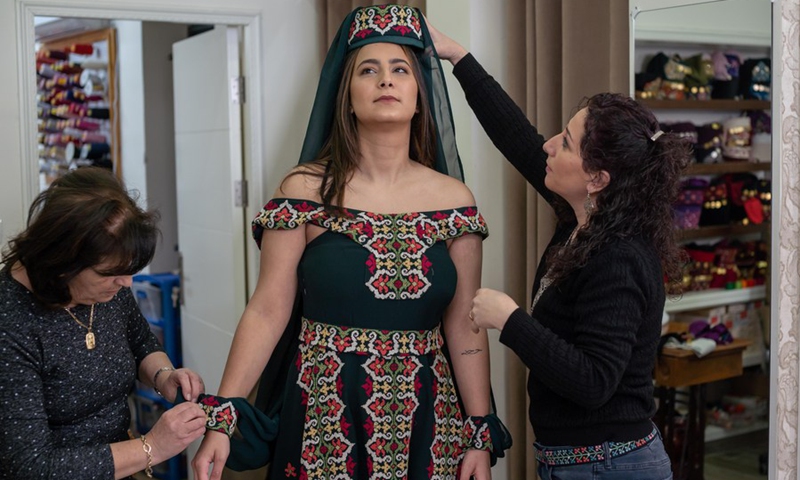
Palestinian fashion designer Khawla al-Tawil (R) helps a model to put on one of her designs at her store in the West Bank town of Beit Sahour, on Feb. 9, 2022.(Photo: Xinhua)

Palestinian fashion designer Khawla al-Tawil worked at her store in the West Bank town of Beit Sahour, on Feb. 9, 2022.(Photo: Xinhua)

A model is seen wearing a dress designed by Palestinian designer Khawla al-Tawil in the West Bank town of Beit Sahour, on Feb. 9, 2022.(Photo: Xinhua)

Palestinian fashion designer Khawla al-Tawil (R) helps a model to put on one of her designs at her store in the West Bank town of Beit Sahour on Feb. 9, 2022.(Photo: Xinhua)
Khawla al-Tawil, a Palestinian designer from the West Bank, has been busy serving those who came to her clothes shop for the exquisite traditional embroidery.
After working 20 years for consumer brands in the West Bank, the 44-year-old mother of three has managed to make her own mark by giving a touch of modern fashion to the Palestinian hand-embroidered costumes.
More than a decade ago, "I was seriously considering opening my own business, but I didn't know how to stand out from the dozens of other highly skilled designers," she told Xinhua.
Then an old Palestinian woman who wore a traditional dress embroidered with aesthetic patterns came to her sight, a pivotal moment for her to truly embark on a more creative path.
"I wondered what if I started designing fashion using the art of embroidery ... I didn't think much and finally decided to design and produce my first (fashion) collection," she added.
But that task was not easy for the Palestinian woman, as her new project needed a great deal of time and effort, especially since she had a job at that time and there was no helper for her new career.
She decided to quit her job and devote herself to preparing for her project, and she spent about a year designing her first collection.
"At first, I was afraid of failure, I did not have specific customers at that time, and I did not know how to sell this collection," she recalled. Nevertheless, she was determined to continue her chosen path.
In 2009, al-Tawil made her debut as a designer on a fashion show in the city of Ramallah held as part of the activities during the holy Muslim month of Ramadan.
With many types of clothing including dresses, trousers and jackets, and a white embroidered wedding dress, her design collections were among the most applauded on show.
The attendees were amazed at her ability to adapt the art of embroidery to "beautiful and modern" fashion, the designer said.
"That moment assured me that I have taken my first steps towards success and fame, at least in the Palestinian territories," she said. "It was an indescribable feeling."
She contented that having faith in her own talent helps to get through the hard beginning, win the initial success and later on open a designer store Bint Al Balad.
"I wanted to be distinguished. I also wanted to contribute even a little to preserving our Palestinian heritage and identity in a new way that would have its own resonance," she said.
In 2021, the United Nations Educational, Scientific and Cultural Organization (UNESCO) inscribed "the art of embroidery in Palestine, practices, skills, knowledge and rituals" on the Representative List of the Intangible Cultural Heritage of Humanity.
"Year by year there is a greater demand for the Palestinian dress on public and private occasions. Women are proud to wear them," she said.
Al-Tawil embroiders local elements into her design, such as roses, leaves, and grapes that the Palestinian territories are renowned for.
"I have my own fingerprint for my designs, and I'm very happy that customers know it," she said, adding that it has encouraged her to attend more local fashion shows.
The designer said she is longing to go on fashion shows in Europe and hone her skills by training outside the Palestinian territories on how to use advanced technology in design.
"This is our history and heritage, and it is important to be recognized on the global stage ... We have our civilized history, which every Palestinian should be proud of," al-Tawil said.
Soha al-Tawil from the West Bank town of Bethlehem is one of the hundreds of customers who come to shop for Palestinian traditional clothes.
"It is good that we preserve our heritage and be proud that we are recovering our forgotten civilization," she told Xinhua while wearing a newly bought embroidered dress.
